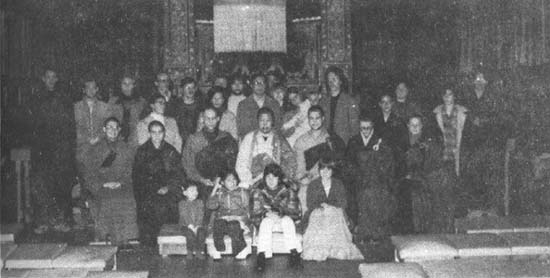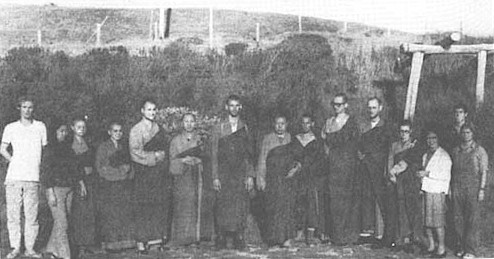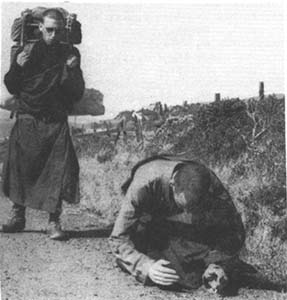News
from the Dharma Realm
DEEP ROOTS SEND UP BODHI SPROUTS
Late in November 1973, a group of serious students of the Buddhadharma had an opportunity to take refuge with the Triple Jewel. This opportunity arose out of the sincerity and earnest wishes of Upasaka Kuo K'uan Klein and his wife, Upasika Kuo Hsi, and their children, Kuo Kuang and Kuo Chien. They had heard about the unsurpassed Dharma of the Venerable Abbot of Gold Mountain, and although they had long wished to draw near the Master, each of their many attempts to come to Gold Mountain had been frustrated. Finally they were able to drive more than 600 miles to San Francisco late in November without mishap to take part in an impromptu two-hour ceremony during which they, along with seven others, became disciples of the Venerable Master Hua. The Kleins were able to visit Gold Mountain for several days, and were in high spirits and joyous over their chance to be near and pay their respects to the Master.

Shown above, directly behind the Master, is Upasaka Kuo K’ai Lew, and directly in front of the Master, in the center, are Kuo Ch’en and Kuo Yuan Lew, his children. Kuo K’ai is the husband of Upasika T’an Kuo Shih (to his right) a long time disciple of the Venerable Master and one of the founders of the Buddhist Lecture Hall and instrumental in setting up the Sino-American Buddhist Association. Others who took refuge on the same day are shown here with some of the four-fold assembly of disciples. They are: Kuo Chen Clowery, a Ph.D. candidate at Berkeley; Kuo Shih Schweig held by his mother, Kuo Ch’in; Kuo Chu Nowak from Ontario, Canada; and the Klein family from Portland.
TRANSLATION
INSTITUTE FOUNDED
(Opening speeches continued from issue
#44)
Bhiksu Heng Kuan:
The next speaker is Dharma Master Heng Yin. Before she speaks I would like to say a few words about her because she represents some twenty people who have been trained as translators at the Sino-American Buddhist Association. The Association insures a solid foundation for translation work, which requires solid practice.
Dharma Master Heng Yin has thus far translated the Sixth Patriarch Dharma Jewel Platform Sutra with the collected lectures of the Venerable Master Hua which runs some 430 pages and has been recently published. She is also presently working on the collected lectures of the Venerable Master Hua on the Amitabha Sutra and the Great Compassion Heart Dharani Sutras both of which will soon be ready for publication. In addition to this she has translated smaller works and has done a lot of biographical work, all out of Asian languages. She works easily with Chinese and Sanskrit.
More important than her scholarly accomplishments is her ability to cultivate, which includes mantric practices, sitting meditation and being able to undergo a certain amount of bitterness in order to understand the important and profound principles. She has, over several years, maintained the practices of eating only one meal a day at noon and never lying down to sleep. She has a quick intelligence and is able to memorize entire books, for example, the Surangama Sutra.
The Institute plans to train translators the likes of Dharma Master Heng Yin so that the entire Tripitaka may be translated accurately into Western languages. This is done with the hope for world peace and the enlightenment of all people. So now I would like to introduce Dharma Master Heng Yin.
Bhiksuni Heng Yin:
Superior Ones, have compassion, all Dharma Masters have compassion, all Upasakas and Upasikas compassion, all mountain elders and good advisors compassion. Today the Sino-American Buddhist Association and Gold Mountain Monastery opens the International institute for the Translation of Buddhist Texts and it is a very important event. Why?
In the Surangama Sutra the Buddha gives an analogy. "It is as if a man pointed to the moon to show it to someone, but that person instead of looking at the moon, looked at the man's finger. He not only did not see the moon, but he didn't really see the finger either. Why? Because he thought that the finger was the moon." He was more confused than when he began.
In the analogy, the finger represents the Dharma, which the Buddha spoke. All the Dharma was spoken to counteract the afflictions of living beings. But if you mistakenly think that the words of the Buddha are the Buddha's enlightenment itself, you have missed the point.
The opening of the International Institute for the Translation of Buddhist Texts is extremely auspicious because although some Sutras have been translated into Western languages, there has not yet been a united effort made by people who are determined not only to translate Sutras, but also to pot the principles within them into actual practice. Thus can we obtain the true benefit of Dharma, the liberation which is gained only through true practice, and spread the Buddha's teaching to all beings as well.
So today's opening will make sure that people can come to see the moon—your own Buddha-nature, your own self-nature which is pure and bright—by means of the finger, the Buddhadharma, the methods taught by the Buddha. My hope today is that, through a united effort, everyone may come to see the real moon. Thank you.
Bhiksu Heng Kuan:
We are happy to welcome Consul General Hung of the Republic of China to say a few words.
Consul General Hung:
Today is an especially joyful occasion, and I am extremely delighted to be able to join you. The translation of texts is a most important part of Buddhism today, and so the establishment of the International Institute for the Translation of Buddhist Texts is especially meaningful. I hone not deeply investigated the Buddhadharma, but I do know that the most important work of Buddhism is to save all living beings. I hope that the translation efforts here bill enable Buddhism to circulate throughout the entire world so that all will accept it.
(Mr. Hung then spoke in English)
I now would like to speak a few words in English. Ladies and Gentlemen, it is a great honor and privilege to be here on this auspicious occasion. To net the spirit of Buddhism is universal sympathy and charity. I do hope that the spirit of this great effort of your people here at the International Institute for the translation of Buddhist Texts will carry to the people of the Western Hemisphere a greater understanding of the Asian countries and their main concepts there so that we can achieve a much more peaceful world, so that people eon live peacefully together and cherish the same thought and help achieve the common goal of the unity of the whole world. Thank you. Ladies and gentleman.
Bhiksu Heng Kuan:
The next person who will speak is Dharma Master Heng Hsien, another member of the Sino-American Buddhist Association and an avid translator. She is a Ph.D. candidate in Sanskrit at Berkeley. Not only is she fluent in Sanskrit but also works extremely easily out of Chinese, Tibetan, and more than a handful of Western languages. She also knows classical Latin and Greek. As a member of the Buddhist Text Translation Society and the International Institute for the Translation of Buddhist Texts, she combines the study of Buddhism and translation of texts with very firm practice. Like Dharma Master Heng Yin she cultivates the bitter practices of eating only one meal a day and not lying down to sleep, spending several hours a day in meditation and several hours a day concentrating on mantric practices, chanting, and the like. She cultivates the important practices, which lead to enlightenment, and translates works so that other people put the same principles into practice. We are very happy now to have Dharma Master Heng Hsien speak.
Bhiksuni Heng Hsien:
Compassionate Original Teacher, Aiding Master, and all Good Knowing Advisors. In the Avatamsaka Sutra there is a four-line gatha which says, "In languages of gods, of dragons, yaksas ghosts, kumbhandas, up to humans, non-humans and the like, in every kind of language of every living being, in each and every sound I'll speak the Dharma."
In Sanskrit this is,
Deva-rutebhi ca naga-rutebhir
Yaksa-kumbhanda-manusya, rutebhih
Yani ca sarva-jagasya rutani
Tesu rutesy ahu desayi dharmam.
This verse was spoken by Samantabhadra Bodhisattva. We should now follow that great Bodhisattva in making great vows, vows of great practice to make the Buddhadharma accessible universally to all living beings and in their own language. Thank you.
to be continued
BUDDHA'S BIRTHDAY
The Sino-American Buddhist Association, Gold Mountain
Dhyana Monastery , and the Vajra Bodhi Sea Publication Society will sponsor the Buddha's Birthday Celebration
this year, and cordially invite all Buddhists to attend
the anniversary of the birth of our original teacher, Sakyamuni Buddha. The holiday falls on Monday, April 29th
this year, and the major celebrations and ceremonies will take place on Sunday, April 28th.
SET THIS DAY ASIDE NOW!
FEATURE ARTICLE
BOWING TO MAKE A PEACEFUL WORLD
by Bhiksuni Heng Ch'ih
of the United States
Two Buddhist Bhiksus (monks) heading north on Route I make a full prostration after every third step they take. They are using
this method to seek for world peace. Those who see the two--who are among 17 members of the Orthodox Buddhist
Sangha at Gold Mountain in San Francisco--may find it strange to watch them repeatedly
make the five-point prostration during which the arms, legs, and head touch the ground.
"Look! they're kissing the earth," one woman in a small seaside town exclaimed to her husband in alarm. "Should we call the
sheriff?"
"What's the matter, fellow," drawled an old farmer from his field, "did you lose an election bet?"
Some instinctively recognize the motivation behind the bowing, however, like the black road worker who, when asked if he had seen
two monks pass by said, "Yep, they're up the way prayin'."
Although the non-violent method of bowing once every three steps may seem strange to Americans, it has been practiced in
China, most notably by the Venerable Master Hsu Yun, Patriarch in the lineage of all five Zen sects.
Bhiksu Heng Ju has vowed to complete the 1,000-mile journey from San Francisco to Seattle bowing
once every three steps, but because it is all but unknown in this country, many fail to recognize the amount of determination and
courage such a practice requires. Nevertheless, when Heng Ju explains what he is doing to questioning onlookers, quite often their
attitudes change from ones of sarcasm to ones of respect when they
hear of Heng Ju's vow.
The two monks--Bhik5u Heng Yo has vowed to assist Heng Ju throughout the 1,000-mile trek—average about 5 miles of bowing a
day in spite of the severe winds, driving rains, and the steady drop in temperature they experience along the coastal route. They
are extremely intent upon their work, and often rise from a cold, wet night's sleep—both ascetics sleep sitting up and eat only one
meal a day—to break camp in pitch dark and be on the road bowing long before the grey morning light. The constant rain leaves them soaking wet and vulnerable to the penetrating winds both day and
night, but it does not succeed in dampening their spirits.
"Most folks think the weather will defeat us," writes Heng Yo in his daily journal, "they think we should try to complete the
1,000 miles in April when the good weather comes,"
The two bhiksus continue to bow, however, and to undergo
bitter suffering on behalf of all beings—they hope to evoke a response from spiritual beings who
will be moved to extend their compassion to a world darkened by the ever-increasing threat of
natural disasters and man-made destruction. In order to accomplish this aim, they say that it is necessary to cultivate pure practices,
observe strict moral discipline, and keep their minds free from distracting thoughts. If they can achieve a single-pointed
concentration and sustain it. they believe without a doubt that they will obtain
a response which will benefit everyone in the entire world.

Shown here are Bhiksus Heng Ju and Heng Yo to the left and right of the Venerable Master Hua
who, with some other members of the four-fold assembly at Gold Mountain, visited the bowing monks
on the road. Also shown is Bhiksu Miu King, Abbot of Hong K'ong's Tung Lum Nien Fah Jong, who has
been a guest at Gold Mountain this autumn.
